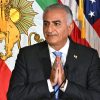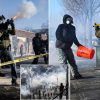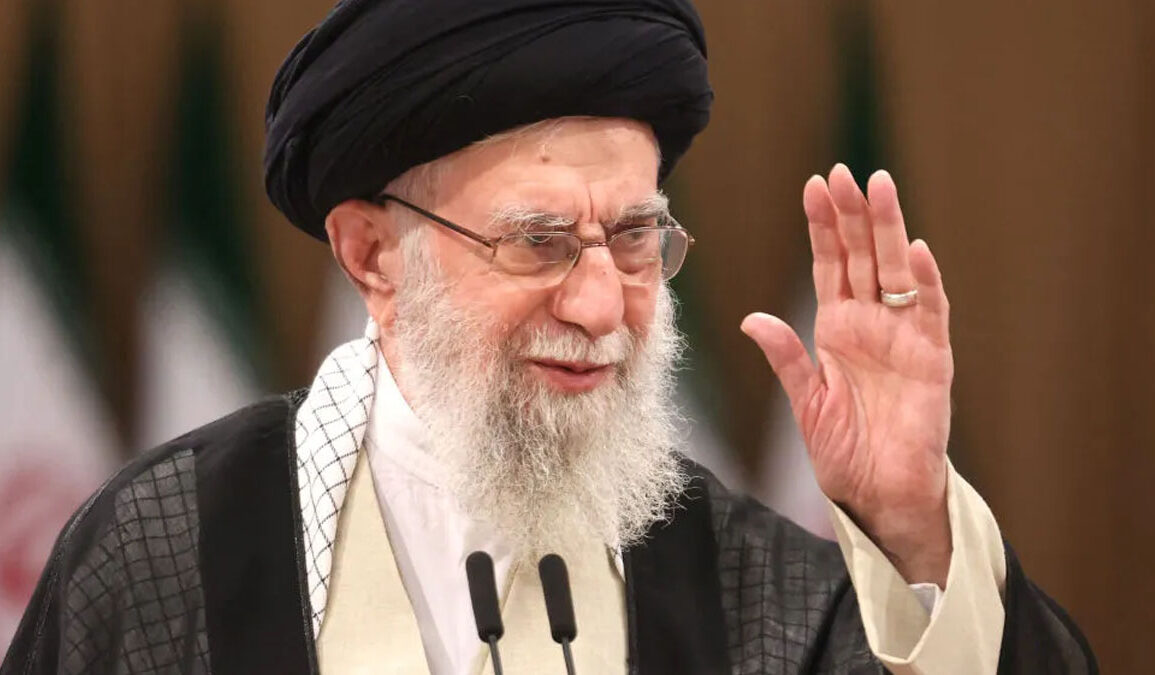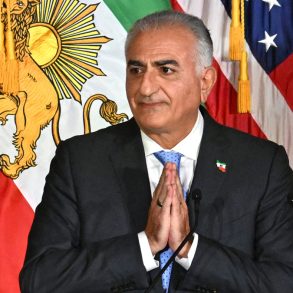Iran’s Supreme Leader Ayatollah Ali Khamenei emerged from hiding Thursday to declare victory over the United States and Israel, claiming Iran had successfully retaliated for attacks on its nuclear facilities. In his first public appearance since the war began, Khamenei called Iran’s missile strike on a U.S. base in Qatar a “slap to America’s face” and insisted that the Islamic Republic was triumphant despite widespread destruction and significant losses.
Khamenei’s speech, aired on Iranian state television, marked his first public comments since June 19. He appeared visibly aged and weak, speaking in a strained and sometimes stumbling voice. The 86-year-old leader had gone into hiding in a secure location shortly after the conflict began on June 13, when Israeli forces launched massive airstrikes against Iranian nuclear and military targets.
In the speech, Khamenei claimed, “The Islamic Republic was victorious and, in retaliation, delivered a hand slap to America’s face.” He described the missile strike on the U.S. military base in Qatar as a warning that Iran could hit American forces in the region at any time. “This action can be repeated in the future,” he warned. “Should any aggression occur, the enemy will definitely pay a heavy price.”
He dismissed President Trump’s claim that U.S. strikes had obliterated Iran’s nuclear program, saying the American leader was engaging in “showmanship” and exaggerating the effects. “They could not achieve anything significant,” Khamenei stated.
Reality Contradicts the Supreme Leader’s Claims
Despite Khamenei’s insistence that Iran suffered minimal damage, international experts and even Iranian officials offered a different picture. Rafael Grossi, Director General of the International Atomic Energy Agency, said the damage to Iran’s nuclear sites was “very, very, very considerable.” Speaking to French broadcaster RFI, Grossi explained that centrifuges at the Fordow enrichment site had been completely disabled. “Given the power of these devices and the technical characteristics of a centrifuge, we already know that these centrifuges are no longer operational,” he said.
Esmail Baghaei, Iran’s Foreign Ministry spokesman, also admitted that “our nuclear installations have been badly damaged, that’s for sure.”
President Trump, speaking at a press conference in The Hague, described the strikes as a complete success. “This was complete and total obliteration,” he said. Trump revealed that seven B-2 bombers were used to drop bunker-buster bombs on the Fordow site, while U.S. submarines fired cruise missiles at the Natanz and Isfahan nuclear facilities. He stated the goal was not to start a war or remove the regime but to end Iran’s pursuit of nuclear weapons.
Secretary of State Marco Rubio added during the NATO summit that Iran had been set back by years. “There’s no way Iran comes to the table if somehow nothing happened. They are way behind today compared to where they were just seven days ago,” Rubio said.
Human and Strategic Costs Mount
The damage extended beyond infrastructure. Iran’s military and nuclear leadership was deeply affected. Dozens of top nuclear scientists and commanders were reportedly killed during Israeli and U.S. operations. Human Rights Activists, a group based in Washington, reported that 1,054 Iranians were killed, including 417 civilians and 318 members of the security forces. Over 4,400 people were wounded. Iran’s government acknowledged at least 606 deaths and more than 5,300 injuries.
Israel also suffered losses, with at least 28 people killed and over 1,000 wounded in Iranian missile attacks.
Iran’s Supreme Leader remained silent for most of the 12-day war, reportedly fearing an assassination attempt. Israel’s Operation Rising Lion included not only airstrikes but also covert missions that destroyed ground-to-air defense systems in and around Tehran.
Khamenei Pushes a Narrative of Resistance
Despite the heavy toll, Khamenei’s speech emphasized defiance. On social media, he claimed, “With all that commotion and all those claims, the Zionist regime was practically knocked out and crushed under the blows of the Islamic Republic.” He accused the United States of entering the war only to save Israel. “It felt that if it did not intervene, the Zionist regime would be utterly destroyed,” he said.
His rhetoric found support among Iranian hardliners. State television and conservative clerics framed the U.S. base strike as a bold act of resistance. “We have shown America that their bases are within our reach,” a senior commander of the Revolutionary Guard said on national television.
Others were less convinced. International observers noted the strike on the American base in Qatar caused no injuries or significant damage. Trump said the U.S. had received advanced notice of the attack, suggesting it was more symbolic than strategic.
A Fragile Ceasefire and Uncertain Talks
Following the U.S. strikes, a ceasefire was negotiated by President Trump and announced earlier this week. The agreement came just hours after Iran launched its missiles at Qatar. Trump also pressured Israeli Prime Minister Benjamin Netanyahu not to retaliate, even after Israel accused Iran of violating the ceasefire by continuing to fire rockets.
Despite the uneasy truce, the Trump administration said it hopes to restart nuclear talks. U.S. Mideast envoy Steve Witkoff confirmed there have been indirect communications with Iran, though Tehran has not publicly agreed to new talks. A planned sixth round of negotiations in Oman was canceled after the war began.
Iran’s parliament has responded by pushing legislation that would end cooperation with the IAEA, the U.N. watchdog that has monitored Iran’s nuclear activities for years. If passed, the law would signal that Iran is preparing to move forward with its nuclear ambitions without international oversight.
The Illusion of Victory
Khamenei’s declaration of victory stands in sharp contrast to the physical and political reality facing Iran. Satellite images show massive craters where enrichment facilities once stood. International experts confirm years of nuclear progress have been wiped out. Key military leaders are gone. The economy, already under stress, now faces further isolation.
While Khamenei’s followers may cheer his defiant tone, the broader world sees his statement as disconnected from the facts. Iran struck back, but at a staggering price. The Islamic Republic is now weaker, not stronger.
NP Editor: It would be interesting to know what the Iranian people are thinking, what they are aware of and how much they believe what the Ayatollah is saying. They can’t be that stupid. Or can they?








